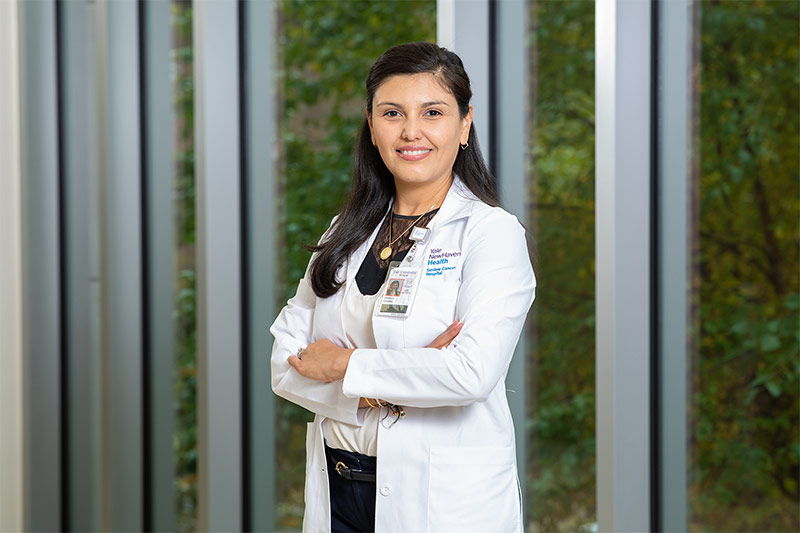
Popular Locations
- Outpatient Surgery - Bridgeport Hospital
- Park Avenue Medical Center
- Primary Care Center - Bridgeport Hospital

Published June 23, 2023

A breast cancer diagnosis can be devastating in any language – but what if you don’t speak or understand the language? At Bridgeport Hospital, a new Hispanic Breast Cancer Program is breaking new ground while breaking down communication and cultural barriers to better meet the needs of a growing Hispanic population.
And, in August, a new Smilow Cancer Hospital location will open its doors to make access easier for many patients who live in Bridgeport.
“In health care, there are a lot of potential barriers, not only for Hispanics but for other minority populations as well,” said Monica Valero, MD, director of the Hispanic Breast Cancer Program at Bridgeport Hospital and assistant professor of surgery at Yale School of Medicine. “Barriers can interfere with patients receiving high-quality, equitable care.”
In the United States, studies show that racial and ethnic minority patients often face barriers to health care exacerbated by challenges related to insurance, transportation, education and socioeconomics.
“In the Hispanic population, misconceptions about treatment, mistrust of providers and financial constraints constitute some of the most significant barriers,” Dr. Valero said. “The mission of our program is to confront and overcome barriers the Hispanic population may face and improve access to equitable care.”
The Hispanic population is the second largest ethnic group in the United States. Dr. Valero said the addition of a bilingual breast cancer program may make the breast cancer journey more manageable for some patients in this growing demographic.
“During my training, I realized that some patients were reluctant to request an interpreter, and I would ask them in Spanish, ‘Do you understand what the next steps are?’ and sometimes they did not,” Dr. Valero said. “Breast cancer treatment is very complex. This additional service will allow us to advocate for patients who wish to have the conversation in Spanish.”
At Smilow Cancer Hospital in Trumbull, Dr. Valero said the breast cancer team works together to ensure all patients understand the process. “We provide patients with navigation services, access to a bilingual breast-care team, a high-risk clinic and a multidisciplinary team as well as a survivorship program,” she said.
These services will be offered at the new Smilow Cancer Hospital location at Bridgeport Hospital as well.
Through her work with the Hispanic Breast Cancer Program, Dr. Valero plans to focus on education, prevention and outreach to the Hispanic population. Other goals include increasing adherence to breast cancer screening and treatment.
“The future direction is to expand this program to other sites within the Smilow Network and to build a database to report statistics with this particular population and increase minority participation in clinical trials,” Dr. Valero said. “When we reference clinical trials and landmark studies guiding their treatment, the percentage of participation from Hispanics is significantly low.
“This becomes a challenge when we try to extrapolate the results and explain to patients whether they are going to have the exact same outcomes as other ethnic groups – in a word, they are underrepresented,” she explained. “We need to increase the minority participation in breast cancer trials in general, so that we are able to extrapolate the results to every group of women.”
While in medical school, Dr. Valero said she felt very passionate about the speed with which breast cancer treatment was evolving, along with improved outcomes.
“When I started doing breast cancer research, it reinforced my desire to be a breast cancer surgeon,” said Dr. Valero, whose research interests include breast-conserving surgery, health disparities in breast cancer and axillary management of breast disease.
“Day by day, I think breast cancer treatment has evolved significantly, and it is very interesting to see more treatment options available to patients, improved therapy, better quality of life and improved prognosis, which is really the goal in breast cancer treatment,” she said.